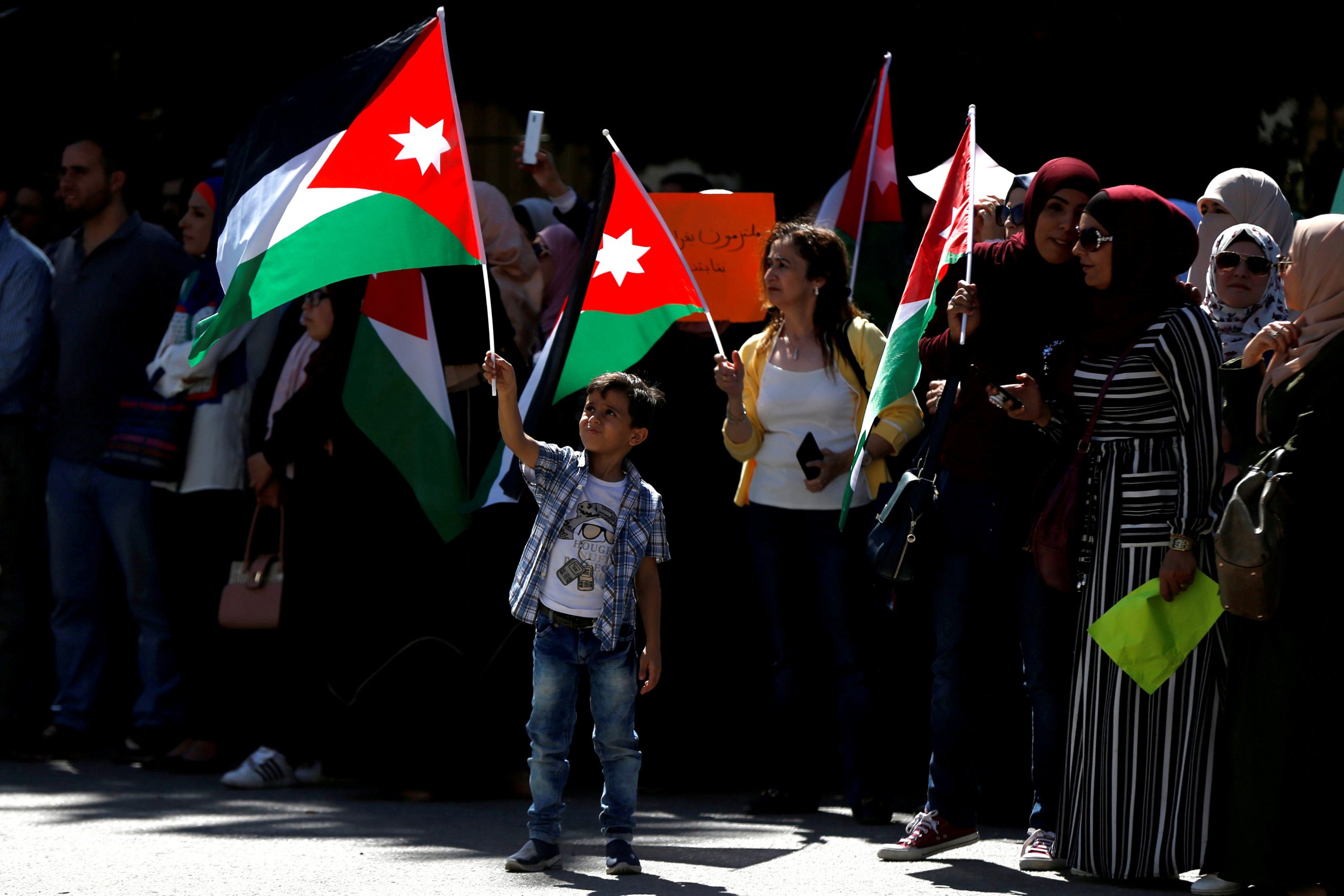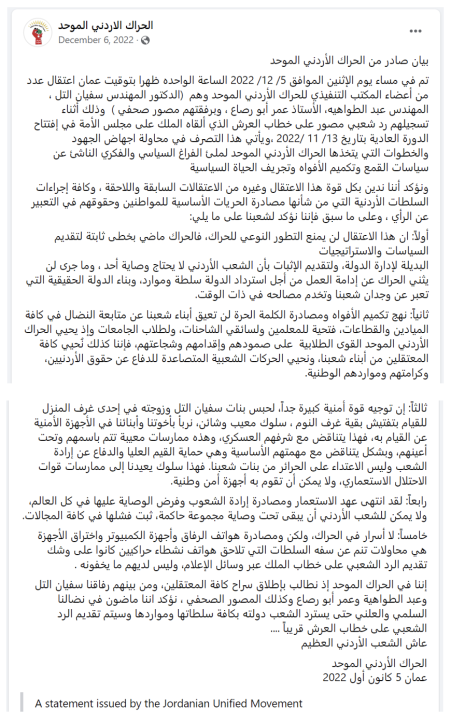Jordan’s digital crackdowns target media and human rights activists
Jordanian authorities monitor and harass journalists and activists to control the information environment
Jordan’s digital crackdowns target media and human rights activists

BANNER: People hold Jordanian national flags as they take part in a protest during a teachers’ strike in Amman, Jordan, October 3, 2019. (Source: Reuters/Muhammad Hamed)
Facing waves of protests in recent years amid deteriorating economic conditions, Jordan has mounted a crackdown on media, activists, and human rights defenders. Jordanian authorities utilize various means of censorship to curb freedom of expression and restrict coverage of certain topics, deploying vague regulations and legislative parameters to punish expression. Other measures to stifle dissent during protests include banning social media platforms, enacting internet shutdowns, or throttling internet access. The Jordanian government has also been accused of using spyware to monitor activists. These tactics are increasingly used in Jordan to help authorities control the information environment and censor free speech.
On December 5, 2022, Jordanian authorities arrested three activists as they were recording a response to King Abdullah II bin Al-Hussein’s November speech in parliament. The activists are members of the executive office of the Al-Hirak Al-Mowahad movement, also known as Hirak. Police also arrested a videographer alongside the three activists. Authorities confiscated phones and laptops during the raid, which took place at the house of the 87-year-old activist Sufyan El Tell. In a statement published on Facebook and Twitter, Hirak condemned the arrests, the silencing of free speech, and “measures taken by the Jordanian authorities to restrict citizens’ basic freedoms and their rights to express their opinion.”

The December 2022 arrests of the Hirak activists took place amid a wave of protests and strikes led by truck drivers over rising fuel prices, rising food costs, and cuts to bread and fuel subsidies that have impacted many Jordanians. Amid the demonstrations, the Jordan Open Source Association (JOSA) confirmed internet shutdowns targeted mobile phones and 4G services in the southern cities of Maan and Karak.
During the protests, some activists used TikTok to broadcasting live from the demonstrations. On December 16, Jordan’s Public Security Directorate announced it was temporarily banning TikTok. In a statement on Facebook announcing the temporary ban, the directorate said, “TikTok has not dealt with the misuse of its platform by users glorifying and publishing acts of violence or calls for chaos.” It also noted that its cybercrime unit monitors for hate speech and incitement of violence, and that it would refer those who publish such content to the courts. In January, Jordanian Communications Minister Faisal Al-Shboul claimed the government talked with TikTok about the app’s reinstatement. He said the ban would not be lifted until TikTok adhered to all Jordanian regulations and laws. According to a query conducted on March 30 using the Open Observatory of Network Interference Explorer, TikTok’s website remains banned in Jordan.
According to the latest available data from TikTok’s Community Guidelines Enforcement report, covering the period from July 1, 2022, to September 30, 2022, the platform removed 310,724 videos in Jordan, of which 86.6 percent were deleted before receiving any views.

In March 2021, Jordanian users reported issues connecting to the audio app Clubhouse, noting the service only worked when using a virtual private network (VPN). JOSA confirmed connectivity issues but noted they were not occurring centrally; rather, they were dependent on the service provider.
Vague laws target dissidents
Jordanian authorities have a history of harassing, arresting, and interrogating journalists, activists, and union representatives, often charging them under vague criminal provisions, including those related to broadcasting fake or exaggerated news or spreading messages that are insulting to the monarchy or are critical of the state. Jordanian authorities have also utilized a controversial crime prevention law to arbitrarily and preemptively detain individuals ahead of planned protests. The Jordanian government and security forces have weaponized the judicial system to curb freedom of speech and harass journalists and activists. Counterterrorism laws have been utilized to silence dissent, as was the case with Jordanian cartoonist Emad Hajjaj, who was detained in August 2020 under Jordan’s counterterrorism law and referred to the State Security Court for disturbing Jordan’s relations with a foreign state. Hajjaj had shared a cartoon online referencing the Abraham Accords, which normalized relations between Israel and the United Arab Emirates.
Under the pretext of Jordan’s COVID-19 pandemic prevention measures, authorities issued a state of emergency in 2020. They enacted Defense Order No. 8, which prohibited “publishing, re-publishing, or circulating any news about the epidemic in order to terrify people or cause panic among them via media, telephone, or social media.” In May 2022, King Abdullah II announced during a speech marking Jordan’s 76th Independence Day that the defense orders adopted to address the COVID-19 pandemic would be scrapped. However, during the two years that the order was active, it was utilized to arrest several journalists, media executives, and a former member of parliament.
Further, Article 11 of Jordan’s cybercrime law is frequently used to crack down on journalists and silence critics. The article states, “Anyone who intentionally sends, resends, or publishes data or information through the information network or the website or any information system that involves defamation, slander, or humiliation of any person, shall be imprisoned for a period of no less than three months and pay a fine of no less than JD100 and not more than JD2000.” Human Rights Watch reported in September 2022 that “there were 2,140 court cases on the basis of Article 11 of the cybercrime law,” according to statistics from National Center for Human Rights (NCHR).
According to Jordan’s communications minister, the country is currently working on a strategy with other Arab countries to draft a law to “organize Arab countries’ relationship with social media platforms and protect users from harmful and illegal content.”
Further, in 2020, Jordanian teachers reported harassment attempts and limits to their free speech during a teachers’ strike and protest. Following the 2020 protests, the government announced the two-year closure of the Jordan Teachers Syndicate, a union representing teachers in Jordan. During the 2020 protests, authorities arrested around one thousand teachers, some under the COVID-19 emergency law and others under the cybercrime law. In some cases, teachers were convicted and sentenced to prison for social media posts supporting the protests. During the demonstrations, the Jordanian government also throttled Facebook Live and banned media coverage of teacher protests.
Gag orders censor press
Jordanian authorities so tightly control what narratives are acceptable that only one domestic news outlet, AmmanNet, dared to cover the Pandora Papers in 2021. However, after publication, the General Intelligence Directorate asked the outlet to remove the story. The Pandora Papers, published by the International Consortium of Investigative Journalists, documented the financial records of current and former world leaders. Included in the investigation was information about King Abdullah’s foreign assets. The Royal Hashemite Court said it “categorically rejects” the reporting and described it as distorted and misleading.
In another example of Jordan’s wide-ranging crackdown, King Abdullah’s half-brother, former crown prince Prince Hamza, was placed under house arrest in April 2021. During this time, Jordanian authorities issued a gag order to ban the media from reporting on the case. The Jordanian government commonly uses gag orders to control coverage of certain topics. Prince Hamza’s house arrest occurred amid accusations that he was colluding with a foreign government to destabilize Jordan’s security and plan a coup, claims the prince denied in a video sent by his lawyer to the BBC. In May 2022, the Prince’s “communications, place of residence, and movements” were restricted by a royal decree.
Jordanian authorities have also been tied to inauthentic social media networks that promoted content praising the king and the military and criticizing Prince Hamza. In June 2021, Facebook announced it had removed eighty-nine Facebook accounts, thirty-five pages, three groups, and sixteen Instagram accounts in Jordan with ties to the Jordanian military.
Further, a survey of thirty Jordanian journalists conducted by the Center for Defending Freedom of Journalists (CDFJ) in May 2022 revealed that most journalists surveyed believe that media censorship exists. About 63 percent of respondents said they believe that the government deliberately blocks websites that transmit news or information, 96 percent believe that the government deliberately censors websites and topics related to the local opposition or foreign affairs, and 90 percent believe that the government or its security services interfere with the media’s work. The survey highlights the level of censorship encountered by Jordanian journalists and its impact on access to information and free speech in Jordan.
Cyber tools monitor activists
Offensive cyber tools have also been utilized to monitor activists in Jordan. According to a report by Front Line Defenders and the Citizen Lab, “Four Jordanian human rights defenders, lawyers, and journalists were surveilled through the use of NSO Group’s Pegasus spyware between August 2019 and December 2021.” The report stated that the identified Pegasus operators responsible for the hacking were “likely agencies of the Jordanian government.” The government denied involvement. It remains unclear when Jordan obtained access to Pegasus spyware. The Israeli media outlet Haaretz reported in August 2020 that internal documents revealed that the NSO Group uses the code name “Jaguar” to refer to Jordan. In 2021, Axios reported that the Jordanian government had negotiated with the Israeli spyware firm NSO Group for surveillance technology.
According to the US State Department’s Jordan 2021 Human Rights Report, the Jordanian constitution “protects the right to privacy but allows for surveillance,” which permits the Jordanian government to order surveillance if there are terrorism-related suspicions. However, targeting activists with spyware, as exemplified in the Front Line Defenders and Citizen Lab investigation, indicates that government surveillance extends beyond court-ordered terrorism-related surveillance.
Jordan is one of the United States’ strongest Middle East allies and one of the top recipients of US foreign aid. King Abdullah visited Washington in February 2023, his second trip in less than a year and the third trip since US President Joe Biden took office in January 2021. During the most recent visit, King Abdullah met with US Congressional leaders, US Secretary of State Antony Blinken, USAID Administrator Samantha Power, and had a private lunch with Biden. Published statements about the meetings did not mention any discussion of Jordan’s increasing crackdowns on dissent or the use of commercial spyware. Secretary Blinken expressed “deep concern regarding recent violence and Israeli-Palestinian tensions” but did not comment on recent clashes between security forces and protesters in Jordan. USAID Administrator Samantha Power “commended the critical reforms Jordan is undertaking with US support.”
In 2021, the US government increased its security cooperation with Jordan, including on cybersecurity. Historically, the United States’ security cooperation with Jordan entailed providing security forces with arms and training. In 2022, the US said it would provide Jordan $1.45 billion annually in bilateral foreign assistance between the US fiscal years 2023 and 2029. A statement issued by the US State Department regarding a visit to Jordan in February 2023 by Uzra Zeya, Under Secretary of State for Civilian Security, Democracy, and Human Rights, noted that Zeya would highlight “the importance of respecting freedom of expression.” As the United States increases its cooperation with Jordan to provide the government with more support on cybersecurity, it is essential to highlight Jordan’s utilization of digital means to surveil and censor its citizens and curb dissent.
Cite this case study:
Dina Sadek, “Jordan’s digital crackdowns target media and human rights activists,” Digital Forensic Research Lab (DFRLab), May 4, 2023, https://dfrlab.org/2023/05/04/jordans-digital-crackdowns-target-media-and-human-rights-activists.

